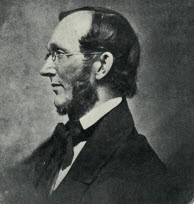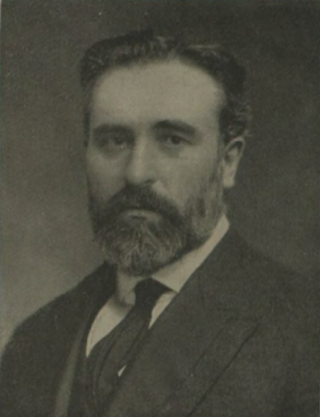Metaphysics is the branch of philosophy that studies the fundamental nature of reality. This includes studies of the first principles of: being or existence, identity, change, consciousness, space and time, necessity, actuality, and possibility. It can also include questions about the existence of God, as well as relationships between foundational philosophical ideas such as between mind and matter, cause and effect, substance and attribute, or potentiality and actuality.
In philosophy, rationalism is the epistemological view that "regards reason as the chief source and test of knowledge" or "any view appealing to reason as a source of knowledge or justification", often in contrast to other possible sources of knowledge such as faith, tradition, or sensory experience. More formally, rationalism is defined as a methodology or a theory "in which the criterion of truth is not sensory but intellectual and deductive".

James Martineau was a British religious philosopher influential in the history of Unitarianism.

The Vienna Circle of logical empiricism was a group of elite philosophers and scientists drawn from the natural and social sciences, logic and mathematics who met regularly from 1924 to 1936 at the University of Vienna, chaired by Moritz Schlick. The Vienna Circle had a profound influence on 20th-century philosophy, especially philosophy of science and analytic philosophy.

Joseph Martin McCabe was an English writer and speaker on freethought, after having been a Roman Catholic priest earlier in his life. He was "one of the great mouthpieces of freethought in England". Becoming a critic of the Catholic Church, McCabe joined groups such as the Rationalist Association and the National Secular Society. He criticised Christianity from a rationalist perspective, but also was involved in the South Place Ethical Society which grew out of dissenting Protestantism and was a precursor of modern secular humanism.
The Thinker's Library was a series of 140 hardcover books published between 1929 and 1951 for the Rationalist Press Association by Watts & Co., London, a company founded by the brothers John and Charles Watts and then run by the latter's son Charles Albert Watts. The name was suggested by Archibald Robertson, a member of the company's board of directors, who took an active interest in setting up the series and was later to write several volumes himself. The Thinker’s Library was intended as a successor to the cheap paperback “Sixpenny Reprints” from the same publisher, the aim being to bring humanist, philosophical and scientific works to as wide an audience as possible. Unlike the previous series, the volumes in the Thinker’s Library were small hardbacks bound in brown clothette, with grey dustjackets, priced at one shilling. The covers of the early editions featured title, author’s name and a brief description of the book between Doric columns, with the image of Rodin’s The Thinker at the foot. The design would change several times over the course of the series, but the figure of the Thinker remained ever-present.

Francis Bowen was an American philosopher, writer, and educationalist.

Sir Edmund Taylor Whittaker was a British mathematician, physicist, and historian of science. Whittaker was a leading mathematical scholar of the early 20th-century who contributed widely to applied mathematics and was renowned for his research in mathematical physics and numerical analysis, including the theory of special functions, along with his contributions to astronomy, celestial mechanics, the history of physics, and digital signal processing.
David Wiggins is an English moral philosopher, metaphysician, and philosophical logician working especially on identity and issues in meta-ethics.

John Mackinnon Robertson was a prolific Scottish journalist, advocate of rationalism and secularism, and Liberal Member of Parliament for Tyneside from 1906 to 1918.
Metaphysics is the branch of philosophy that investigates principles of reality transcending those of any particular science. Cosmology and ontology are traditional branches of metaphysics. It is concerned with explaining the fundamental nature of being and the world. Someone who studies metaphysics can be called either a "metaphysician" or a "metaphysicist".
The following outline is provided as an overview of and topical guide to metaphysics:
Henry Grove was an English nonconformist minister, theologian, and dissenting tutor.

John William Nevill Watkins was an English philosopher, a professor at the London School of Economics from 1966 until his retirement in 1989 and a prominent proponent of critical rationalism.

Die Leugnung der Geschichtlichkeit Jesu in Vergangenheit und Gegenwart was a 1926 book in German by Arthur Drews on Christ myth theory.
In the philosophy of science, observations are said to be "theory-laden" when they are affected by the theoretical presuppositions held by the investigator. The thesis of theory-ladenness is most strongly associated with the late 1950s and early 1960s work of Norwood Russell Hanson, Thomas Kuhn, and Paul Feyerabend, and was probably first put forth by Pierre Duhem about 50 years earlier.
Archibald Horace Mann Robertson was an English civil servant who became a writer on history, social affairs from a left-wing perspective and critiques of Christianity.
Louis Gordon Rylands, best known as L. Gordon Rylands was a British criminologist and writer.
Dutch philosophy is a broad branch of philosophy that discusses the contributions of Dutch philosophers to the discourse of Western philosophy and Renaissance philosophy. The philosophy, as its own entity, arose in the 16th and 17th centuries through the philosophical studies of Desiderius Erasmus and Baruch Spinoza. The adoption of the humanistic perspective by Erasmus, despite his Christian background, and rational but theocentric perspective expounded by Spinoza, supported each of these philosopher's works. In general, the philosophy revolved around acknowledging the reality of human self-determination and rational thought rather than focusing on traditional ideals of fatalism and virtue raised in Christianity. The roots of philosophical frameworks like the mind-body dualism and monism debate can also be traced to Dutch philosophy, which is attributed to 17th century philosopher René Descartes. Descartes was both a mathematician and philosopher during the Dutch Golden Age, despite being from the Kingdom of France. Modern Dutch philosophers like D.H. Th. Vollenhoven provided critical analyses on the dichotomy between dualism and monism.








